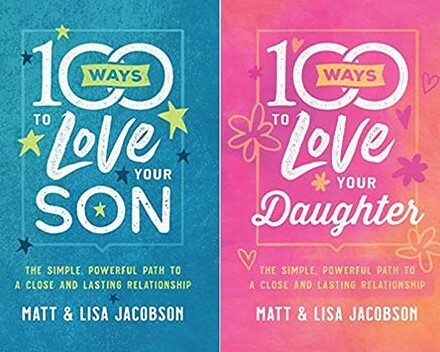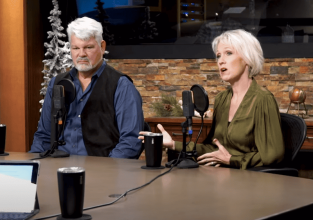Excerpt:
Matt Jacobson: The real core of it is communicating that you actually like them as a person. Every parent loves their kids, right? “Oh, I love my kids.” Yeah. But do you like them? Do you like being with them? Do you like their personalities? Are they people that you value just because of who they are, not what they are going to accomplish or what they’ve done?
End of Excerpt
John Fuller: Insights from Matt Jacobson describing how you and I can better parent our children through intentionality and respect, encouragement, even a hug from time to time. Uh, Matt and his wife, Lisa, are back with us today on Focus on the Family. Your host is Focus president and author, Jim Daly, and I’m John Fuller.
Jim Daly: Uh, John, we had a wonderful conversation last time with the Jacobson’s, uh, gleaning many of their insights from raising eight, eight, that’s right, count them, eight kids. And I so appreciated their vulnerability and simple, down-to-earth approach, really. Matt and Lisa aren’t experts by any means. They’ve made mistakes and have struggled at times in their parenting journey. But along the way, they’ve learned to love their children well, which, I think if you read scripture, that’s the most important thing. Uh, last time they shared some great tips for raising sons and daughters, and I’m lookin’ forward to more of the same today. If you missed the conversation last time, uh, you can get the download or a CD copy, or get our, uh, app so you can listen on the go.
John: Yeah, the Jacobson’s have a great message for parents born out of their experiences and, uh, based on scripture. And they’ve written a couple of books, 100 Ways to Love Your Daughter, and 100 Ways to Love Your Son. And you can find those books and more, including the audio from our conversation last time at focusonthefamily.com/broadcast, or call for details, 800-A-FAMILY.
Jim: Uh, John, we should also mention our 7 Traits of Effective Parenting Assessment. Uh, this is a free online resource based on research that’s designed to help you maximize your role as mom or dad. Uh, there’s no formula for perfecting parenting, but there are some predictors or factors that will help your kids thrive in things like adaptability, boundaries, and grace and forgiveness. You can learn more about all the seven traits when you take the assessment at our website.
John: And again, that’s focusonthefamily.com/broadcast. And now, let’s return to our conversation with Matt and Lisa Jacobson on Focus on the Family.
Jim: Let’s get to your family mottoes.
Matt: Okay.
Jim: I think you have a couple of those.
Matt: (laughs)
Jim: Uh, (laughs) first of all, these aren’t rules, obviously.
Matt: Nope.
Jim: These are mottoes.
Matt: Mottoes.
Jim: Um, so wh- what are they?
Matt: Well, uh, one of the principle ones is “Jacobson’s never give up.” And where that gets applied is if the child is given a job to do, and somehow, “It’s just so hard, and I just can’t do it,” well, “Jacobson’s never give up. So, uh, you get to stay at it, and we work until the job’s done, not until we’re tired and don’t wanna do it anymore.” So and, and that’s something that we’ve just spoken into their hearts from a very early age.
Jim: Do you have a … I think you have a wood cutting example, right?
Matt: (laughs)
Jim: Which I would think, being from the Northwest.
Matt: Yeah, (laughs) that’s right. Well, yeah, we have a fireplace and, and we like a good … Lisa, especially, likes a good blaze-
Jim: (laughs)
Matt: … in the, in the, in the winter. Uh, and what I do is I, uh, get couple cords of rounds. That’s the tree cut as a round, not cut into firewood, and I give the job to the boys. And, um, and I do, and in this case, I tell ’em, “Hey, you work like a man, you’ll get paid like a man.” But, uh, so they’re out there working away, and then the youngest of, at the time, the youngest said, “I’m just gettin’ tired. I don’t …” And the older two go, “Jacobson’s never give up.
Jim: (laughs)
Matt: So we’re gonna stay here until this gets done.”
Jim: Oh.
Lisa Jacobson: And I think he was five, under six.
Jim: Oh, you’re kidding.
Matt: No, no, no, they’re young.
Lisa: He was little, no, a little guy.
Jim: Oh, my goodness.
Matt: They’re young.
Lisa: Yeah.
Matt: By the time [Britton 00:04:51]-
Lisa: But he’d carry one in the house-
Jim: Ax-wielding five-year olds, oh, my …
Lisa: (laughs)
Matt: But he, th- I think he got to pack the wood.
Lisa: Was he, the pack the wood in the house, yeah. I know how much …
Jim: (laughs)
Matt: But yeah, but from the age of, I would say, eight on, eight or nine on, Britton, our oldest, and then the other, uh, kids as they came along, handled the wood. I never touched it. For, for years, I’ve never cut wood. I’ve never l- started a fire, except r- on a, the random occasion. So the kids, we give kids the jobs, and then we expect ’em to do it. So that’s Jacobson’s never give up. And then, uh, there’s always a way to get something done.
Jim: Yeah, g- uh, Lisa, do you got one of the three or four that is your favorite of the mottoes?
Lisa: (laughs)
Jim: “Never give up,” obviously. “Never give in.”
Lisa: There’s always a way to get something done is super helpful. Like, or y- your child’ll come in the room, and they just have that, “I don’t know what to do.” And, and aren’t we all fixers or is that just me? Like, I just wanna help them. “Can’t you see that all you need to do,” instead of s- stopping myself and going, “No-
John: Hmm.
Lisa: … the best thing I can do is equip you to figure out. You can figure out what needs to happen here.” And then Stephen just came up last week when, um, we had an issue in the kitchen. And, our youngest son, in whom I’m most prone to s- help. (laughs)
Jim: Aww.
Lisa: He’s got those big, blue eyes, and he’s …
Jim: He’s got, (laughs) oh, those big, blue eyes.
Matt: (laughs)
Jim: I see a little pinky finger.
Lisa: He just kinda gives me this little helpless look, and I’m just getting ready to … I thought, “No, Lisa, don’t do it. (laughs) Son, you can figure this out.”
Jim: Yeah, that’s good. Those are really good. Um, Lisa, I do wanna circle back on the beauty question, because I think-
Lisa: Mm.
Jim: … y- you know, again, this is such a struggle for so many women, uh, young women, particularly. What is a practical way, both for moms and then maybe, Matt, you can tell me for dads, too, to really affirm them in h- how God has created them. I wanna make sure we hit that very squarely, and, you know, cover the gambit. Y- y- not everybody is gonna be the front page of Vogue or whatever, and how do you become comfortable as a young woman in how God and who God has made you?
Lisa: Well, I’ll start off with a mistake I made early on is that I didn’t want to emphasize beauty or looks because I thought that was a bad thing. I thought that was just emphasizing all the wrong things. So I talked a lot about how smart my girls were or how talented they were, and I rarely talked about their looks. And then when they were in their teenage years, um, several of the girls said to me, like, “Mom, do you think I’m beautiful?” I’m like, “How, of course you’re beautiful. Didn’t you know that? And I hadn’t, I didn’t think you would struggle with that. And I didn’t know that, that you needed to hear that from me.” So I switched tactics-
John: Hmm.
Lisa: … about that point and thought, “Okay, I need to be pouring into it. I do need to emphasize those things. I do think you’re beautiful, and that, that doesn’t have to be a surface thing. Beauty is so much more than surface.” But the girls, they, they did need to hear that they’re attractive, and they have beautiful eyes or lovely hair or lots of other positive traits.
John: Yeah. This was an experience that my wife had to go through.
Lisa: Sure.
John: Her mom had a real emphasis on beauty; not, not vanity, but just in beauty.
Lisa: Yeah. Yeah.
John: And, and I think Dena will tell you, she kind of reacted the other end of the spectrum and-
Lisa: Mm-hmm (affirmative).
John: … same thing with our girls. She did not emphasize a lot of that.
Lisa: Mm-hmm (affirmative).
John: And, um, I, I think the Lord allowed me to kinda speak into that part of their life in a way that she just didn’t feel comfortable doing.
Lisa: Mm-hmm (affirmative).
John: So, we really are a team when it comes to parenting.
Matt: Absolutely. Yeah. [crosstalk 00:08:03].
Jim: No, that’s a good point. And, uh, yeah. So, um, you also urge parents to respect their kids.
Matt: Mm-hmm (affirmative).
Jim: Uh, some parents, this is huge, because I think this is the relational breaking point when a parent can’t develop or chooses not to develop respect. And there’s maybe some good rationalization, right? W- “If you, if you saw the way my child does not clean his room, does not do these things I expected him, you wouldn’t respect him either.” So, speak to me as that dad with that attitude.
Matt: Well, absolutely. So, uh, we like to say relative to the mar- marriage relationship, if, if a man isn’t respecting his wife, he’s in the process of destroying his marriage.
John: Mm.
Matt: And it’s absolutely the same in, with your kids.
Jim: Wow.
Matt: If you don’t learn to respect your kids, you’re actually creating distance. And I wanna tell on myself. So, we had a men’s meeting yesterday morning in our church. And my, the older sons that are at home attend, and we were goin’ around offering prayer requests. But I’ve got, we’ve got this one son who’s pretty stoic, doesn’t say much of anything. Uh, but he’s a very loving child, but he’s just not very communicative. And I turned to him and I said, “Hey, Sonny, you got somethin’ you wanna share?” Anyway, I put him on the spot. He, he’s 18, going on 19, but I put him on the spot in front of all the other men. The next morning, we had a conversation. And he said, “Dad, I didn’t feel respected by you-
Jim: Mm.
Matt: … in that moment.” And so-
Jim: Well, that’s interesting, yeah.
Matt: … and, and, and so, uh, that’s the last thing I want my kids to think is that I don’t respect them. So, I got to apologize to him and ask forgiveness.
Jim: Yeah.
Matt: And so, uh, but it’s, it’s super critical to … Uh, especially, we’re talking about those intervening years where they’re transitioning to adulthood.
Jim: Yeah.
Matt: They’re gonna make a ton of mistakes. And remember how perfect you were as a parent at that age?
John: (laughs)
Lisa: (laughs)
Matt: Remember how far along you were, right?
John: Yeah.
Matt: And so, we shouldn’t expect our kids to encounter life and respond to it as we do as mature adults.
Jim: Yeah, le- lemme ask you, though, Matt, real practical.
Matt: Mm-hmm (affirmative).
Jim: Uh, what does that respect look like? What, I mean, again, I could, I could easily fall into that same trap that you had-
Matt: Mm-hmm (affirmative).
Jim: … because I’m trying to pull him out. I think I’m doing something good-
Matt: (laughs) Right. Yep.
Jim: … to say to him, “Hey, do you have anything?” In front of everybody else, and y- maybe he’ll step up and have the courage that-
Matt: Yep.
Jim: … I’m helping to develop-
Matt: Yeah, right. (laughs)
Jim: … uh, to say something in front of eight-
Matt: Sure.
Jim: … 10, 12 other guys.
Matt: Yeah. Yep.
Jim: Um, so y- y- y- how, how do you ma- … What is respect toward your kids? What does it look like? What are those things that we should be communicating?
Matt: Well, the first, the first thing that w- we would tell our kids is, “Y- you, you don’t get respect because you walked in the room. You get respect because you earned it.” Okay, so when they, uh, respond to maybe a large job that they’re given, when they’re faithful with chores that they’ve had-
Jim: Mm-hmm (affirmative).
Matt: … and day in, day out, they take care of ’em. When they do really well on their schooling because they’ve applied themselves, and they’ve studied and they’ve worked hard, and have achieved something, that, those are all moments, big and small. And, and if it’s a toddler and he, you said, “Take the cup and put it in the kitchen.” You know, you affirm him in that. But telling your sons, the words … See, we all have these deep, wonderful feelings for our kids, right? But they’re not worth anything if we don’t actually communicate to them-
John: Hmm.
Matt: … those deep, wonderful feelings. So personally, I’m looking for opportunities all the time, um, and if it’s an, uh, specific accomplishment, or if it’s just a, an analysis that one of the kids made of some news story they saw-
Jim: Uh-huh (affirmative).
Matt: … I’m affirming that. And I say s-, “Man, I really respect how you think.”
Jim: Mm-hmm (affirmative).
Matt: “I really, really love the way your brain works.”
Jim: Yeah.
Matt: Just looking for opportunities to give respect. And one of the ways to give respect to your kids is to stay out of the way of their sometimes good and sometimes bad decisions.
Jim: Yeah, that’s so hard.
Matt: But sub- it is so hard, ’cause we know better.
Jim: ‘Cause you wanna jump in and straight out the crooked road.
Matt: Yep.
Jim: And here’s the better path, and-
Matt: Yeah.
Jim: … I mean, don’t do that, and do this. Um, in that regard, um, would you encourage a dad or a mom to actually … Especially with their older teen children, ’cause I could see that, even in my own relationship, it’d be good for me to sit down and say, “How can I show you respect?
Matt: Mm-hmm (affirmative).
Jim: Wh- what do I do today that undermines my respect for you? ‘Cause my respect for you is sky high.
Matt: Absolutely.
Jim: But sometimes, you know, the way I ask a question or the way-
Matt: Mm-hmm (affirmative).
Jim: … I engage with you may-
Matt: Mm-hmm (affirmative).
Jim: … may communicate, uh, a lack of respect and that’s never my intention.
Matt: Sure.
Jim: But can you help me better understand?” That’s how I would have to do it, ’cause-
Matt: Absolutely.
Jim: … sometimes I’m just thick-headed, right?
Matt: Sure. Sure. Well, we want the best and we know the best, right? We think we do.
Jim: Yeah. (laughs)
Matt: And we’re, we’re so ready with, uh, our advice. I’ve actually asked my kids that.
Jim: Yeah.
Lisa: Mm-hmm (affirmative).
Matt: And I’m thinking of-
Jim: I’m gonna do that.
Matt: I’m thinking of one in particular, and he said, “Every time we get together to talk, I feel like you’re coming at me with your answer, as opposed to just letting me figure it out.” And, uh, even though that’s one of our mottoes in life, “You can figure it out,” uh, but as they’re older teens and the stakes are getting higher for the decisions that they make-
Jim: Yeah.
Matt: … you go, “Okay, there’s some serious ditches on the side of, uh, either side of this road.”
Jim: Right.
Matt: And you kinda wanna weigh in a little more heav- heavily, but you have to let your kid be the person that God created them to be, and-
Jim: Well, lemme, lemme say it this way, because I’m learning this. Ditches aren’t all bad.
Matt: No, they’re very instructive.
Jim: They’re very instructive.
Matt: Yep.
Jim: They’re very tough. Define that ditch, okay-
Matt: Mm-hmm (affirmative).
Jim: … I’m not gonna do that. But I’m just saying that the Lord is in the ditch, too, with you.
Matt: Mm-hmm (affirmative). Yeah.
Jim: And I, I just see so many strong, young people that have moments of weakness, they fall into the ditch. And then when you can parent well in that environment-
Matt: Mm-hmm (affirmative).
Jim: … to allow them to crawl outta that ditch-
Matt: Mm-hmm (affirmative).
Jim: … that can be a lifelong spiritual education.
Matt: Yep.
Jim: And it could be used to get them closer to the Lord. And isn’t it an irony that we will pray, as a couple-
Lisa: Mm-hmm (affirmative).
John: … in bed at night, “Lord, I pray for our kids.
Lisa: Mm-hmm (affirmative).
Jim: I pray for our child, that he would grow closer to You.” And then the Lord says, “Okay.” And then He takes ’em into a ditch-
Matt: Yep.
Jim: … to get them closer to Him, and we panic. And isn’t that an irony that we would panic in that environment-
Matt: (laughs)
Jim: … rather than be doing all the good things we’ve talked about so far.
Matt: No, it is. But you can even verbalize that to your son or daughter. You can say, um, “Th- this is what I see and here are the options. Here are the potential consequences, but it’s your decision to make, and I’m gonna respect you, whatever decision you make.”
Jim: Yeah. Lisa, let me ask you something that was on your website about that transition from, you know, working i- in a job that you enjoyed, getting married. Uh, then you talk about having kids, and now, the importance of having at least one parent at home, and mom, is that gonna be you? And that was a discussion Jean and I had. I mean, she was coming out of a … She was in the lab at a university teaching student about, uh, gene splicing with nuclear material. (laughs) I mean, I was like, “What are you doing?” And, uh, you know, when we were getting pregnant, that wasn’t a good environment for the health of Trent, it would’ve been at that time. But h- setting that aside, and then seeing the job of being a mom and the importance of it, h- how did you process all that?
Lisa: Yeah, becoming a mother was a huge shock to me.
Jim: (laughs)
Lisa: Um, (laughs) because I, I was raised in a more, a home that was just more, a little more career minded. I had lots of … I traveled a lot. I’d had a lotta schooling, and so, becoming a mother, and all of a sudden having this huge responsibility in these little people was overwhelming to me. It was a big adjustment. And I, I thought I would be better prepared for it. I thought, it was the first time I found myself in a place that I, I didn’t feel like I was good at it, and I knew the stakes were high. Like, I knew I was impacting these people’s lives. And, um, so it, it really threw me on my knees to say, “Okay, Lord, You’re gonna have to help me see what I can do here and how I need to, to grow as a person.”
Jim: Yeah, and I, I think, uh, boy, I resonate with that idea that you came from a family that valued education, professionalism, the degrees. Isn’t that true?
Lisa: Mm-hmm (affirmative). Mm-hmm (affirmative).
Jim: I mean, Jean would have come from that, as well. And I just think for that woman, particularly, to then value, uh, being a great mom-
Lisa: Mm-hmm (affirmative).
Jim: … and what it’s gonna take to do that, there’s so much pressure-
Lisa: Mm-hmm (affirmative).
Jim: … on w- young women today to be everything-
Lisa: Oh, yeah.
Jim: … and ha- … You can’t do it.
Lisa: Yeah.
Jim: What advice in that way, for that 27-year-old who’s been married two years? They’re talkin’ about getting pregnant, what advice do you have for that woman who’s maybe in a career that she’s enjoying?
Lisa: Well, so personally, I believe you get one shot at being a mother and impacting these children’s lives. And so, for me, I would say go all out and be a mother. And not that I didn’t do other things occasionally, and, um, I did have, uh, I helped Matt with his business at times, but my whole focus was my home.
Jim: H- h- lemme ask you, though, how, how does a woman … I agree. I mean, it’s an awesome-
Lisa: Mm-hmm (affirmative).
Jim: … responsibility to put-
Lisa: Mm-hmm (affirmative).
Jim: … all your attention in that direction and not to derive, you know, what the world’s gonna say. “What are, what are you doin’? Don’t you like selling things?” I mean, (laughs) “No.”
Lisa: Mm.
Jim: (laughs) But, but h- where do they derive their sense of meaning and worth in that regard? Um, I think it’s scrambled right now for a lot of-
Lisa: Mm.
Jim: … 25 to 40-year-old women.
Lisa: Yeah, well, when I … Um, I have a lot of younger women in my life, um, that I disciple and, and mentor. And I tell ’em I actually didn’t do a lot of other things when I was raising young kids. I was mostly at home. It’s a full-time job, and it makes such a difference, those foundational years, for more pleasant years ahead.
Jim: Well, do they exhale, or do they get aggravated or both?
Lisa: Um, probably exhale.
Jim: That it’s okay.
Lisa: They actually need permission to go, “You know what? It’s okay for this season. It doesn’t mean that it’s gonna be forever.” They know that, now that my kids are older and most of them are out of the house, that I am doing a lot of other things, and I’m excited to do those things. But back then, I said, I just didn’t really do much. I was really at home with my kids, and it made for pleasant teenage years. It, and they see the relationships I have with my, our, uh, 20-year-old daughters and sons, and it’s a beautiful thing that, that those investment years totally, if you will, paid off.
Jim: Well, and I think, and what I’m driving at is trying to raise the value of, of being at home. I mean, i- it’s priceless, and it’s far better than selling credit cards, let me tell you, I think.
Matt: Well, absolutely. And when you have a vision-
Lisa: Mm.
Matt: … for what God is doing in the world-
Jim: Yeah.
Matt: … and He’s doing it through you with these first disciples that He-
Jim: Mm-hmm (affirmative).
Matt: … entrusted to you, because you really are discipling them, right? And the Bible talks about raising your child in the nurture and the admonition of the Lord. And that, that can only happen with a real concerted focus and again, putting the priorities where God puts them. Because God talks of children as this great blessing, this great inheritance that you’re receiving.
Jim: Your quiver. (laughs)
Matt: Your quiver, so, so am I valuing my kids in the manner that the Bible, uh, values them, and, and-
Jim: Hmm.
Matt: … the emphasis that the Bible places on them. And so, if you align yourself with that kind of thinking, and once again, I go back to the priority, uh, question. You always have time for your real priorities.
Jim: And that’s a, it’s a great self-reflection. And l- l- let me ask you about identity and building a child’s identity in Christ. Uh, I think, you know, we’ve touched on it, but you encourage parents to speak God’s truth into, uh, their children’s minds and hearts. How have you done that with your own children?
Matt: Well, we’ve started out just by, uh, having a great marriage, okay?
Jim: And concentrating on it.
Matt: Absolutely. And I know that a lotta people can’t do that because of life and where, uh, it has taken them. But it’s super important for a husband and a wife to be, to live in harmony with each other, and to love each other, and to respect each other. That’s a great identity starting place for your kids-
Lisa: Mm.
Matt: … that they see this modeled, and they, they have a sense of security, uh, in the marriage, and, and in the home. But, uh, also, you get to do it by example on other non-marriage related things. How am I interacting at, with, in challenges? How am I, how am I responding? Giving them an example to follow, and then just speaking very directly into their lives about what God’s doing in the world, and you’re part of that. You are what God’s doing in the world. You’ve got this tremendous place, this tremendous gifting that’s going to unfold over time. God has a great use of that for-
Jim: Yeah.
Matt: … for His kingdom. And so, giving them a vision and a perspective, uh, for, uh, for who they are. And also teaching your kids not to evaluate their own personal worth based on the things that they’re looking at in society. So much of it is, is artificial. So much of it is, uh, has nothing to do with reality. And yet, those images, those messages, from the advertising world, for instance, that, you know, you really don’t measure up; teaching them to recognize that that’s not the voice of truth speaking to them. God values them tremendously, and so giving them a Biblical perspective on who they are and how God values them, that’s-
Jim: Yeah.
Matt: … the starting place. And then celebrating their gifts as they come along. We have one son, uh, his name is Dauntless, and i- which means undauntable, and boy, does he embody that name.
Jim: (laughs)
Lisa: (laughs)
Jim: He, he signed up.
Matt: He’s, he’s 16, and he’s ready to run a country, you know?
Jim: (laughs) Good for him.
Matt: But, but what, what I’ve told him and what we tell our other kids, you’ve got this great gifting, and we love it, even though sometimes it kinda comes back our way. But, uh, but we love that gifting that God has given you, and just to help them see the awesome creation that they are, and speaking that into their lives on a regular basis.
Jim: Yeah. And I so appreciate that. Let, in the end here, if we can, let … The nitty-gritty of where it’s gone wrong, and I’m mindful of that. I feel like, you know, we have a really good relationship with our boys. I- it’s, it’s almost sweeter by the day.
Matt: Awesome.
Jim: And I love that.
Matt: That is awesome.
Jim: You know, we’ve gone through our difficulties of junior high and high school that are so common. It’s called independence, right?
Matt: Sure.
Jim: And, uh, parents struggle with that-
Matt: Yeah.
John: … phase.
Matt: Yeah.
Jim: Uh, kids struggle with that phase. And Jean, my wife, has done such a good job of, y- kind of letting go.
Matt: Yeah.
Jim: And it’s hard for a mom, and I observed it, and we would talk about it. And we’d have our pillow prayer time, and you know, how, how do we let them own their decision-making now? And, and she, she’s just done a fantastic job, and it’s been great to see our boys turn to us-
Matt: Right.
Jim: … a- a- rather than away from us.
Matt: Yep.
Jim: But I’m mindful of the parents that are going, “Mm, my kid’s now 22. We don’t have that relationship. I didn’t learn that lesson soon enough. There’s angst.
Matt: Mm-hmm (affirmative).
Jim: There’s pain. There may not even be connection.”
Lisa: Mm.
Jim: Because that child, um, you know, it, they just, they re- th- they walked away. What do you do when that’s happening? How do you … And I’m sure you’ve counseled people. How do you begin as the adult, as the older adult, to repair that damage?
Matt: Mm-hmm (affirmative). Well, uh, damage comes from a lotta different sources. And, uh, sometimes, its parent inflicted. Sometimes it’s based on the decisions that a child made, and the path that it set them on, and the decisions that they keep making on that path.
Jim: Sure.
Matt: So, uh, the only thing, uh, uh, that you can do is do what the prodigal son’s father did. He stood, and he was ready with open arms.
Jim: Ran to him.
Matt: He, he was ready. And, uh, just to have that open posture, even if your child has hurt you deeply, to have that posture of, “You know what? I believe in what God wants to do in your life, and I love you.” Communicate that you love them. Own the mistakes if you’ve made them-
Jim: Hmm.
Matt: … own them. Um, Lisa and I have both had to ask forgiveness of our children, uh, individually, from one time or another, for mistakes that we’d made for, for, uh, responding in the flesh. And whatever it is that, that, that was negative that you did, that you own, own it. Speak that to your child. Tell them that you recognize that you’ve made a mistake, and, uh, and then, then ask for forgiveness.
Jim: Yeah.
Matt: And, and it’s, it puts you in a humble position, but I think that’s exactly where God would (laughs) have us as parents is to have a humble heart in what we’re doing. And the main thing is, uh, if, if you’re in a circumstance like that is to have this open-heart policy, I am so ready for you to come home.
Jim: Yeah. No, that’s a beautiful, beautiful thought. And I, I think the key there, too, and I, you know, I see it, you’ve got to, you gotta garden the heart.
Matt: Absolutely.
Jim: And what I mean by that is you gotta uproot bitterness, you gotta-
Matt: Mm-hmm (affirmative).
Jim: … get that spade and dig around those, those nasty roots-
Matt: Yeah.
Jim: … to get those weeds out of the garden, right?
Matt: Yeah.
Jim: And we need to be proactive in that way. And so often, that garden, that relationship between us as a mother or father with our sons or daughters, we, we just ignore it, and that garden gets overrun.
Matt: Yeah.
Lisa: Mm-hmm (affirmative).
Jim: And, and then it’s a big job-
Matt: Yeah.
Jim: … to try to weed it all out.
Matt: Yeah.
Jim: And that would be one of the things you gotta concentrate on. Do the hard work, be engaged, love your children, let them know so that they can come away feeling like, “If nobody else cares about me, I know mom and dad care about me.”
Matt: Absolutely.
Lisa: That’s right.
Jim: Isn’t that the truth?
Lisa: That’s right.
Jim: Wow. Thanks for being with us. This has been so good. It’s, uh, been a bit therapeutic for me.
Matt: Mm.
Jim: Uh, what I need to do and where I need to go, and I hope the listeners have enjoyed this as well. And get a copy of these two books if you have sons and daughters. If you only have one, (laughs) that’s fine. We’ll, uh, we’ll send that to you. But, uh, 100 Ways to Love Your Son, 100 Ways to Love Your Daughter, uh, just a great tool in the toolbox to do a better job parenting. And if you can make a gift to Focus for any amount, we’ll send you your choice of one of these books or both. Just let us know what you need, and we’ll get that out to you as our way of saying thank you for being a part of the ministry.
John: Yeah, we’re supported by those who listen and watch. And, uh, we would rely on your donations in the coming months, if you’d be, uh, capable of making a, a generous donation. So, uh, contact us today, contribute as you can, and request, uh, either one of these books, 100 Ways to Love Your Son or 100 Ways to Love Your Daughter. Our number is 800-A-FAMILY, and online, we’re at focusonthefamily.com/broadcast. And on behalf of Jim Daly and the entire team, thanks for joining us today for Focus on the Family. I’m John Fuller inviting you back as we once again help you and your family thrive in Christ.




























